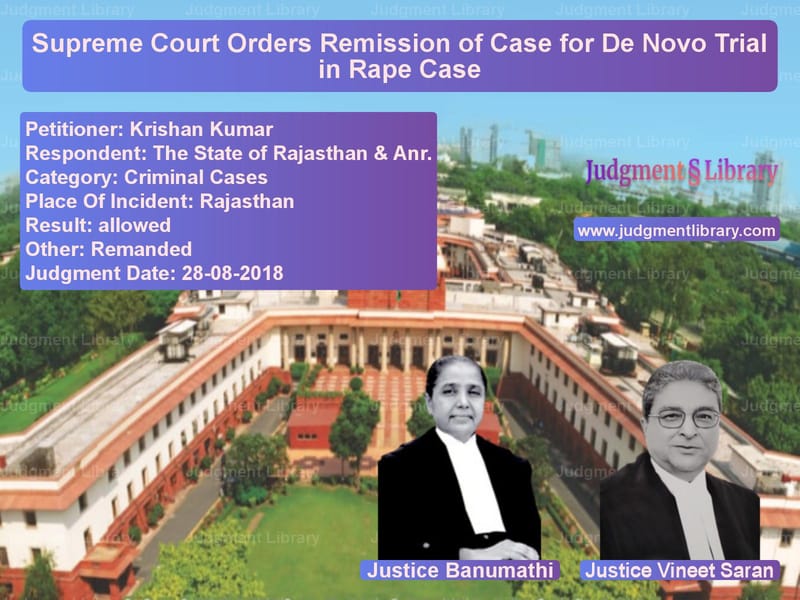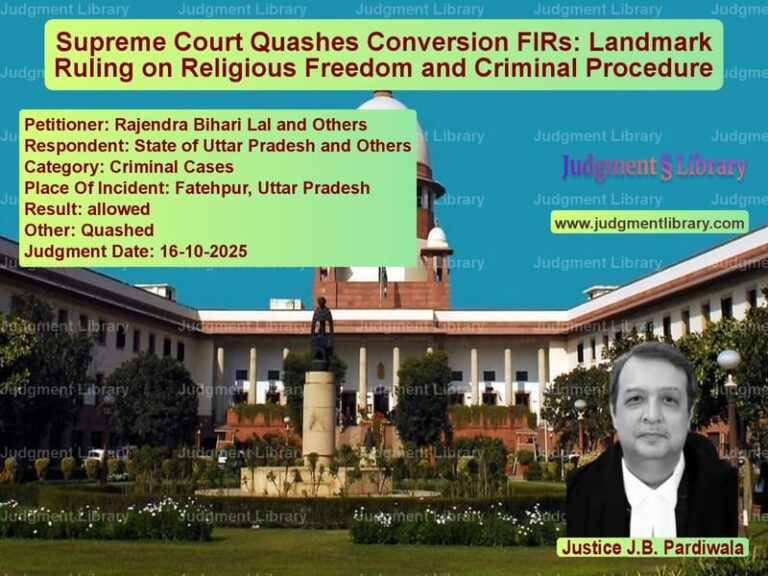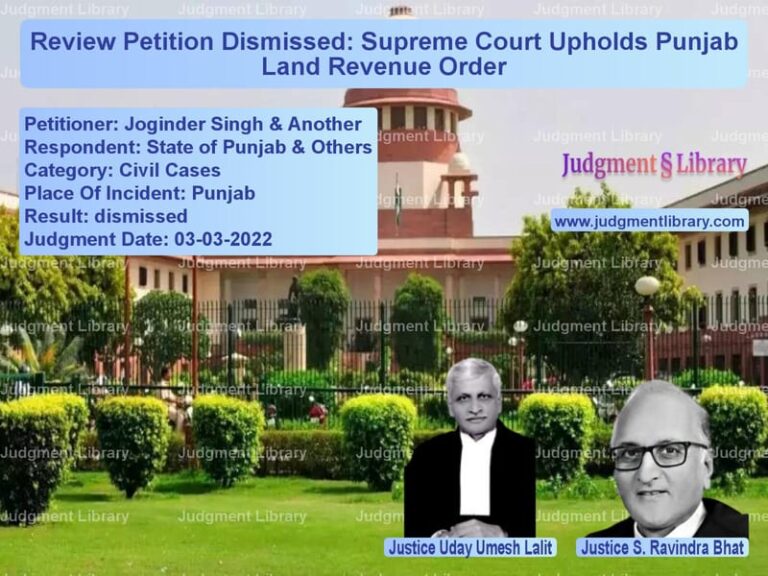Supreme Court Orders Remission of Case for De Novo Trial in Rape Case
The Supreme Court of India, in the case of Krishan Kumar v. The State of Rajasthan & Anr., ruled that the High Court erred in setting aside the acquittal of the appellant and remitting the case for a de novo trial. The judgment, delivered on August 28, 2018, by a bench comprising Justice Banumathi and Justice Vineet Saran, clarified the procedure for handling acquittals in criminal cases and emphasized the right of the appellant to be heard before any adverse orders are passed against him.
Background of the Case
The appellant, Krishan Kumar, was acquitted by the trial court on the grounds of insufficient evidence in a rape case. The trial court had concluded that the prosecution had failed to prove the charges beyond a reasonable doubt. However, the prosecutrix (the complainant) filed an appeal against the acquittal, which led the Rajasthan High Court to set aside the acquittal order and remand the case back to the trial court for a de novo trial. The appellant challenged the High Court’s decision, arguing that it was unjust to overturn an acquittal without providing him an opportunity to be heard.
Petitioner’s (Appellant’s) Arguments
The appellant, represented by his counsel, argued the following:
- The appellant was acquitted by the trial court after a full-fledged trial, and the High Court’s decision to set aside the acquittal was made without giving him an opportunity to present his case.
- The High Court had proceeded with the case in the absence of the appellant and without notice to him, which violated his right to a fair hearing.
- The trial court had concluded that there was a lack of evidence to support the charges of rape, and the acquittal should have been respected.
- The High Court should have issued notice to the appellant before passing any order affecting his acquittal.
Respondent’s (Prosecutrix’s) Arguments
The prosecutrix, represented by her counsel, contended:
- She had filed an appeal against the trial court’s acquittal because the court had failed to appreciate the evidence presented during the trial.
- She argued that the appellant’s acquittal was a miscarriage of justice, as the trial court had ignored crucial pieces of evidence.
- The High Court’s decision to set aside the acquittal was made in the interest of justice, and the appellant should not be allowed to escape the trial due to procedural lapses.
Supreme Court’s Observations
The Supreme Court, after considering both sides, made the following observations:
- The appellant had been acquitted by the trial court after due consideration of the evidence and on the grounds of insufficient proof of the charges.
- The High Court had passed its order without issuing a notice to the appellant, which is a violation of natural justice.
- The appellant’s right to be heard was fundamental, and the High Court should have afforded him an opportunity before remitting the case for a de novo trial.
- The Court emphasized that the principles of fairness and natural justice must be adhered to in all judicial proceedings, especially when an acquittal is being challenged.
- The matter required fresh consideration by the High Court, giving both the appellant and the prosecutrix an opportunity to present their arguments.
Final Judgment
The Supreme Court ruled in favor of the appellant and issued the following directives:
- The order of the Rajasthan High Court was set aside.
- The matter was remitted back to the High Court for fresh consideration, with specific instructions to give both the appellant and the prosecutrix adequate opportunity to be heard.
- The High Court was directed to expedite the proceedings and decide the appeal in accordance with the principles of justice and fairness.
Impact of the Judgment
This ruling has significant implications for criminal trials and the rights of the accused:
- Right to Fair Hearing: The judgment reinforced the importance of affording the appellant a fair opportunity to present his case before any decision is made regarding his acquittal.
- Strengthening Natural Justice: The Supreme Court emphasized that natural justice principles must be adhered to, particularly when a judicial decision is being challenged.
- Reaffirming Acquittal Rights: The judgment clarified that acquittals should not be set aside without affording the accused the right to be heard, even in cases of appeals.
Conclusion
The Supreme Court’s decision in Krishan Kumar v. The State of Rajasthan & Anr. underscores the importance of fairness and transparency in judicial proceedings. By ensuring that the appellant was given a chance to be heard, the Court upheld the principles of natural justice and provided a critical precedent for handling acquittals and appeals in criminal cases.
Petitioner Name: Krishan Kumar.Respondent Name: The State of Rajasthan & Anr..Judgment By: Justice Banumathi, Justice Vineet Saran.Place Of Incident: Rajasthan.Judgment Date: 28-08-2018.
Don’t miss out on the full details! Download the complete judgment in PDF format below and gain valuable insights instantly!
Download Judgment: Krishan Kumar vs The State of Rajasth Supreme Court of India Judgment Dated 28-08-2018.pdf
Direct Downlaod Judgment: Direct downlaod this Judgment
See all petitions in Bail and Anticipatory Bail
See all petitions in Criminal Defamation
See all petitions in Fraud and Forgery
See all petitions in Judgment by R. Banumathi
See all petitions in Judgment by Vineet Saran
See all petitions in allowed
See all petitions in Remanded
See all petitions in supreme court of India judgments August 2018
See all petitions in 2018 judgments
See all posts in Criminal Cases Category
See all allowed petitions in Criminal Cases Category
See all Dismissed petitions in Criminal Cases Category
See all partially allowed petitions in Criminal Cases Category







